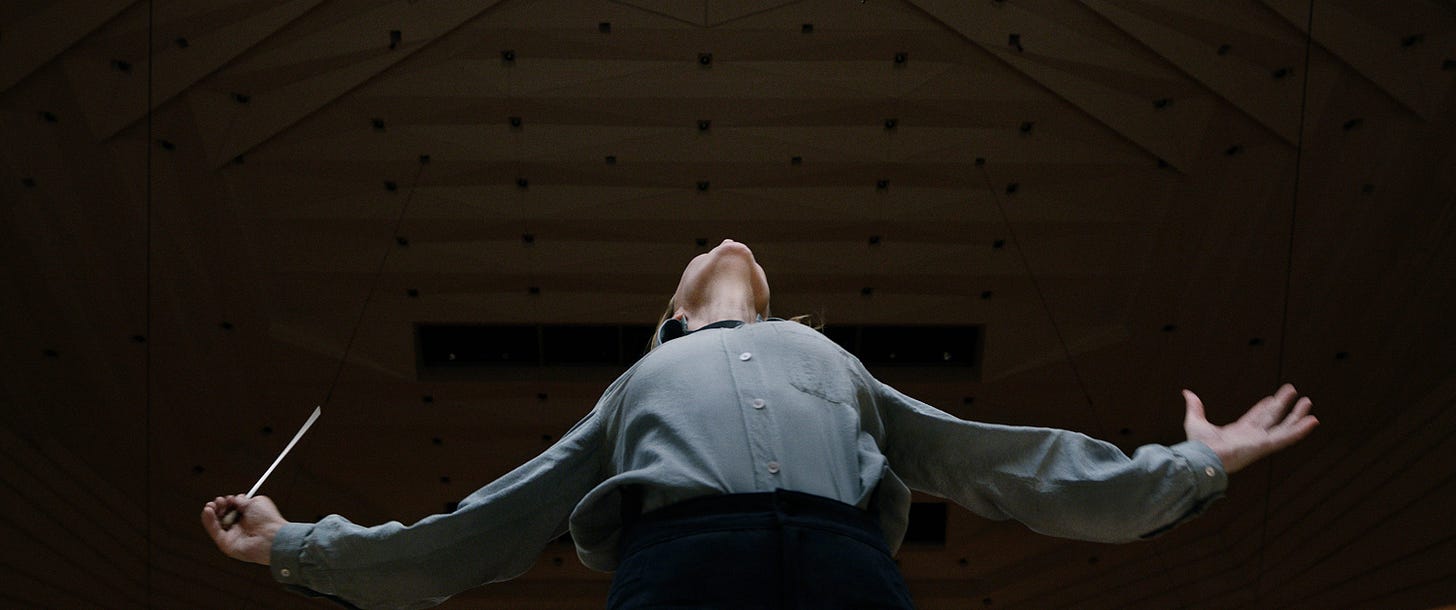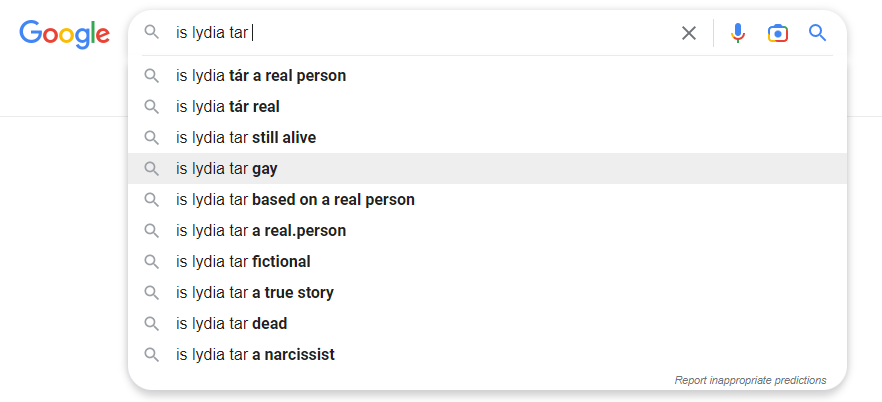Author’s Note: It was impossible to parse my thoughts about this film without getting deep into the plot, so major spoilers ahead.
From the moment the film begins, you have a sense that Tár will be a perpetually playful subversion of expectations. Perhaps nothing sets the viewer up for this more than the film’s opening credits sequence where the typical hierarchy of the film’s production flashes on screen in reverse chronological order, beginning with special thanks to shooting locations, catering, and copyright logos and ending with the main cast. This is going to be a familiar story about power, but director Todd Fields has no intention of letting it unfold in a predictable way, choosing instead to embrace an awkward, frustrating, terrifying, and sometimes absurdly funny messiness. For a movie with such grim subject matter, I didn’t expect to laugh as much as I did.
I’ll admit, I was one of those people who fully believed that Lydia Tár was a real person when I first saw the biopic-style trailer. Even now, over a month after its release, when you try to look up anything about the movie, something along the lines of “is lydia tar a real person?” will always be in the search bar’s autocomplete. There’s a few obvious reasons why: no text ever appears on screen to let viewers know that this is a fictional story not based on real people or events, and the world of classical music is so small and elite that I’m sure many assumed they had just missed some symphony drama because it never broke into mainstream media.
I would also attribute this confusion both to the script and Cate Blanchette’s captivating execution of the material. Blanchette plays Tár’s egotistical selfishness and narcissistic genius with such an intensity that one can understand how others have gotten caught up in her magnetism and why so many people also got hurt. This is a film that could so easily careen into a satire about pretentious cultural elitism, but the fact that it never does, makes the film’s ultimate message all the more impactful.
As reviews started rolling in, many critics began calling Tár one of the the best movies about #MeToo and cancel culture of the year. I take issue with this particular framing of the film not because I think it’s wrong, but because the film does a much better job of exploring the kinds of sexual misconduct and abusive power dynamics called out by activists in the #MeToo movement than it does exploring what it’s like to be publicly canceled. Take, for instance, a painfully long scene at the start of the film where Tár berates a queer student of color in a class at Juilliard for expressing discomfort at conducting Bach’s music along with other problematic white male composers. In addition to being verbally abusive, Tár repeatedly crosses a line with condescending gestures such as bumping the student’s shoulder and forcing them to sit next to her while she castigates them in front of the class. The singled-out student storms out, leaving Tár rather pleased with what she thought to be a successful defense of the canon. Unbeknownst to her, this dressing down was secretly recorded and ends up on Twitter, where it’s been obviously edited to take Tár’s words out of context, enabling her to decry misinformation and avoid accountability. I’m not sure why Field would present this scene again in this way. It felt like this second edited version undercut the impact of the first, where we saw Tár in all of her uncut, horrible glory.
What the film does succeed in showing, however, is the way power can so easily be abused by those who have it. Although we never actually meet Tár’s victim—former student Krista Taylor—the details of what happened between them are slowly pieced together through slivers of information that are nauseating, yet not surprising. Since we experience this through Társ perspective, it’s made to seem that Krista was a troubled student and a heartbroken fan, not someone groomed into an inappropriate relationship with her mentor. Yet, as Tár tries to clean up her inbox following Krista’s suicide, we learn that Tár’s been blacklisting her from other orchestras and ignoring Krista’s escalating cries for help. The film treats the timeworn question of “can we separate the art from the artist?” like a red herring, redirecting our focus instead to the ways artists can weaponize their cultural authority and legacy for personal gain.
Keep reading with a 7-day free trial
Subscribe to Screenshot Reliquary to keep reading this post and get 7 days of free access to the full post archives.






